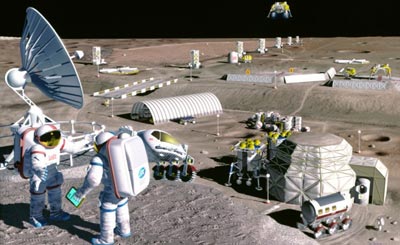While I give the folks at the National Aeronautics and Space Administration credit for trying, they've got an awful lot of misplaced priorities and show no sign of wising up.
As Greg Esterbrook notes in an excellent Slate piece, it's been obvious for at least a decade that the space shuttle program has outlived its usefulness and the space station program is an enormously expensive joke. But NASA keeps putting the bulk of its funding, which is to say my tax money, into them at the cost of programs that should be priorities.
Don't me wrong, there have been and are some spectacular successes, mostly in the form of interplanetary probes that provide a wealth of valuable scientific information and are celebrated here at Science Saturday.
But notes Esterbrook:
At this point, the shuttle exists almost solely to service the space station, while the station exists almost solely to give the space shuttle a destination to fly to. Two space shuttles have exploded on national television. Yet the program drags on owing to the desire of aerospace contractors, and members of Congress who represent shuttle districts, for launches that cost nearly $1 billion each. The shuttle has operated just once since the Columbia loss in February 2003. It may or may not fly in 2006. Most experiments conducted aboard the space station could be done at far less expense by automated probes. "Life science" research on the astronauts themselves is the sole mission that requires people to be present, but even this boils down to billions of dollars spent for astronauts to take each other's blood pressure. As Gar Smith has written, the space station represents "one of the biggest boondoggles since the Pyramids." Despite the dubious rationales for the shuttle and space station, the proposed fiscal 2007 budget fully funds a new round of waste on these programs—about $8 billion, compared with about $5 billion for space probes, Earth study, and study of the distant universe.Esterbrook is appropriately exercised about NASA's disdain for programs dealing with the most important planet of all -- Earth -- and says a resetting of priorities is way overdue:
What would constitute rational budget priorities for NASA? The agency's first emphasis should be research about Earth and the sun. That's the sole area in which NASA spending is odds-on to produce immediate returns for taxpayers. Second, NASA should fund more automated probes and satellites to study this solar system and close-by star systems—the parts of space that might have some effect on us. Almost all NASA findings since the moon program have come from automated probes such as Cassini, which a few weeks ago discovered what appears to be a water vent on a moon of Saturn. Most probe projects cost less than a single launch of the space shuttle. Third, the agency should cancel the shuttle program and use the funds to research new propulsion systems that might fundamentally reduce the price of access to space. A fundamental propulsion breakthrough must come before grand visions like a Mars mission. . . .
Fourth, NASA needs a serious program for searching nearby space for asteroids and comets that might strike Earth and figuring out how to deflect any big rock headed this way. Asteroids and comets large enough to cause devastation may strike Earth distressingly often . . . If NASA protected Earth against a strike from space, that might be, let's say, the most significant accomplishment in human history. Yet NASA has only a minor program to search for "near-Earth objects" and no program to figure out what to do about them. Preventing comet strikes would give taxpayers a return on their money, and we can't have that! The new budget request suggests that no one in the agency's hidebound, turf-obsessed upper management wants to think about what NASA can do to actually benefit the public.

No comments:
Post a Comment